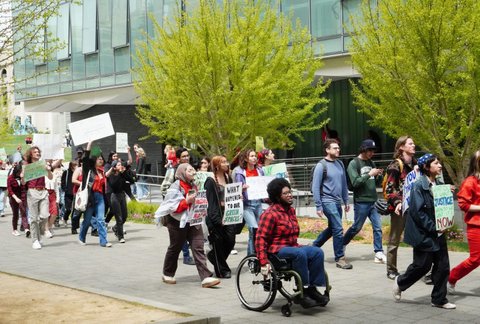
09 Nov Primary or Ranked Choice Voting? Change Likely Coming to Richmond Elections

Two measures to change how Richmond City Council members and the mayor are elected are passing in unofficial results, but only one can ultimately go into effect. (City of Richmond via Bay City News)
By Samantha Kennedy
Unofficial election results show that Richmond voters are likely to see changes to their elections beginning in 2026.
According to the most recent election results Friday afternoon, Measure J and Measure L, which would change how City Council members and the mayor are elected, were both passing.
Measure J has received 16,138 yes votes, or 57.55%, and Measure L has received 15,018 yes votes for 53.67% of the vote. Both measures can pass if they hold on to their majority, but only the one with the most votes will be put in place.
Measure J, which is also known as the Richmond Election Reform Act and was put on the ballot after a petition gathered enough signatures, would require that a City Council or mayoral candidate receive more than 50% of the vote to be elected. The measure would set up a primary system, meaning that the two top vote-getters in the primary — should neither reach 50% of the votes — would face off in a fall general election.
“It will mean better representation for Richmond,” the argument in favor of the measure states, “and an end to Richmond politicians getting elected with less than a true majority of the vote.”
It comes about two years after some Richmond City Council and mayoral candidates were elected with less than 50% of the vote, which some have criticized and point to as one of the reasons for the measure. Mayor Eduardo Martinez, for example, garnered 39% in his race two years ago.
Measure J is supported by former council members Jeff Ritterman and Maria Viramontes, former mayor Tom Butt, Richmond Police Officers Association President Benjamin Therriault and retired union representative Don Gosney.
Opponents of the measure are Yvette Williams Barr, the Richmond chapter president of the International Federation of Professional and Technical Engineers Union Local 21; Lio Meng Saeteurn, the Contra Costa political director for the Asian Pacific Environmental Network; David Sharples, the director of Contra Costa County for the Alliance of Californians for Community Empowerment Action; and Gregory Everetts Jr., the Richmond chapter president of Service Employees International Union Local 1021.
They say the measure is “a power grab” that would “disenfranchise poor voters of color and benefit the biggest polluters in Northern California,” according to an argument against the measure.
If passed, the system would go into place beginning January 2026.
Measure L, which was put on the ballot after a 5-0 city council vote in July, would allow ranked choice voting, also known as instant runoff voting, for city elections. Vice Mayor Claudia Jimenez and council member Soheila Bana were absent at the time of the vote.
The measure, which is also known as the Instant Runoff Voting Election Reform Act, would keep voting in a single election for city races. Voters are allowed to choose more than one candidate with the system, listing them in order of preference.
Proponents are Martinez, Sharples of ACCE, Everetts of SEIU 1021 and Catherine Skinner of FairVote Action; they say their measure would mean better representation in Richmond.
“Democracy is on the ballot in Richmond,” the argument in favor of Measure L says. “To ensure the ‘will of the majority,’ our mayor and city council members should be elected with support from a majority of Richmond voters. Measure L will put in place Instant Runoff Voting (IRV) to ensure that majority winners are decided in a single election and that all our voices are heard.”
Proponents also say the measure would result in a higher voter turnout, save money and create a diverse set of candidates.
But opponents — Ritterman, Butt, Gosney, Viramontes and Therriault — say the measure would implement “a failed system” that is “overly complicated for voters and uses closed systems where accurate vote tabulation is difficult to monitor and audit.”
Richmond would be the first city to implement ranked choice voting in Contra Costa County, though other Bay Area cities like Oakland and San Francisco already use the system.
If the measure passes and receives more votes than Measure J, instant runoff voting could come to Richmond elections as soon as the November 2026 election season, according to an analysis by City Attorney Dave Aleshire. However, “if the voting equipment is not ready, the County elections official may opt out of using the IRV system for one election cycle,” the analysis states.
The Contra Costa County Elections Office is expected to provide another results report on Nov. 13, according to its website, and estimates the number of ballots still needing to be processed is over 84,000.
Ahead of the office’s first interim update on Nov. 8, it said a “high volume of ballots” were received through Election Day dropboxes. An estimate by the office shows around 60,000 vote-by-mail ballots received on or before Election Day are still being counted.
Ballots postmarked on or before Nov. 5 will be counted as long as they are received by Nov. 12.
“Please be patient as we work diligently to process ballots and get the results out,” the office wrote in a Thursday morning post. “The results you see right now from Election night might change with the volume of new ballots we are processing.”






No Comments